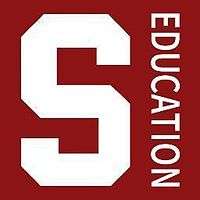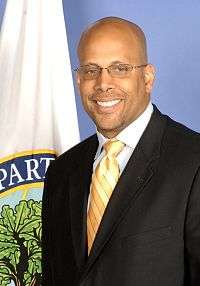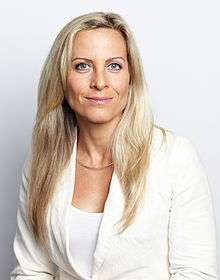Stanford Graduate School of Education
Coordinates: 37°26′N 122°10′W / 37.43°N 122.17°W
 | |
| Type | Private |
|---|---|
| Established | 1891 |
Parent institution | Stanford University |
| Dean | Daniel Schwartz |
Academic staff | 48 |
| Students | 379 |
| Location | Stanford, California, U.S. |
| Campus | Suburban |
| Nickname | Stanford GSE |
| Website |
gse |
The Stanford Graduate School of Education (also known as Stanford GSE, or GSE) is one of the seven schools of Stanford University, and is one of the top education schools in the United States. It was founded in 1891 and offers master's and doctoral programs in more than 25 areas of specialization, along with joint degrees with other programs at Stanford University including business, law, and public policy.[1]
Led by Daniel Schwartz, the mission of Stanford GSE is to continue as a world leader in groundbreaking, cross-disciplinary inquiries that shape educational practices, their conceptual underpinnings, and the professions that serve the enterprise. The GSE also seeks to develop the knowledge, wisdom, and imagination of its students to enable them to take leadership positions in efforts to improve the quality of education around the globe.[2]
History
The Graduate School of Education was founded in 1891 as the Department of the History and Art of Education, one of the original twenty-one departments at Stanford University. It awarded its first Ph.D. in 1916, and in 1917 was renamed the Stanford University School of Education. The Graduate School of Education building and Cubberley Library were built in 1938, and the Stanford Teacher Education Program (STEP) was established in 1959.
In 2001, the Bill & Melinda Gates Foundation donated $5 million to establish the School Redesign Network. The GSE established a public charter school, the East Palo Alto Academy, which has been managed by its New Schools initiative since then. In 2008, the faculty decided unanimously to make scholarly articles available as open educational resources, the first such move by a school of education. In 2009, The GSE established an education minor program for Stanford undergraduates. The program prepares students for careers in teaching, crafting educational policy, and managing schools. In 2013, the school name was changed to the Stanford Graduate School of Education to better reflect its advanced research and its graduate-level preparation of educators, scholars, policy makers and entrepreneurs.[3]
Academics
Stanford GSE offers ten M.A. programs and four Ph.D. programs. Unlike many other schools of education, the programs are academic rather than professional and grant M.A. instead of Ed.M. degrees and Ph.D. instead of Ed.D. degrees. It also has undergraduate honors and minors programs. As a graduate school of education, the undergraduate programs are not degree programs, but instead offer education-related training for students majoring in other areas, as well as co-terminal master's degrees. The largest program is the Stanford Teacher Education Program (STEP), which is the only program which offers a teaching credential for K-12 teachers.
The school also offers numerous professional development programs and resources for practicing elementary and secondary school teachers. These include the Center for the Support of Excellence in Teaching (CSET), the National Board Resource Center (NBRC), the Problem-Solving Cycle, and Stanford English Learner Education Services.[4]
Rankings
Since U.S. News & World Report began ranking schools of education, Stanford has ranked among the top five overall in the United States and has received the top peer assessment score of any school each year. The doctoral program admits 7.2% of applicants, the most selective in the country.[5]
Notable people
Deans
- 1891–1898, Earl Barnes
- 1898–1933, Ellwood Patterson Cubberley
- 1933–1945, Grayson N. Kefauver
- 1945–1954, A. John Bartky
- 1954–1966, I. James Quillen
- 1966–1972, H. Thomas James
- 1972–1980, Arthur Coladarci
- 1980–1986, Myron Atkin
- 1986–1993, Marshall Smith
- 1995–2000, Richard Shavelson
- 2000–2011, Deborah Stipek
- 2011–2014, Claude Steele
- 2014–2015, Deborah Stipek
- 2015–present, Daniel Schwartz
Professors
- Ralph Richard Banks, Jackson Eli Reynolds Professor of Law at Stanford Law School
- Stephen R. Barley, Richard W. Weiland Professor of Engineering
- William Damon, Professor of Education and Senior Fellow at Hoover Institute
- Linda Darling-Hammond, Charles E. Ducommun Professor of Education
- Thomas Ehrlich, former president of Indiana University and dean of Stanford Law School
- Elliot Eisner, Lee Jacks Professor of Education, Emeritus, recipient of the Grawemeyer Award
- Nathaniel Gage, Margaret Jacks Professor of Education, Emeritus
- James G. March, Jack Steele Parker Professor, Emeritus
- Clifford Nass, Thomas M. Storke Professor of Communications
- Nel Noddings, Lee L. Jacks Professor of Child Education, Emeritus
- Roy Pea, David Jacks Professor of Education and the Learning Sciences
- John R. Rickford, J.E. Wallace Sterling Professor of Linguistics and the Humanities
- Lee Shulman, Charles E. Ducommun Professor of Education, Emeritus
- Lewis Terman, creator of the Stanford Binet IQ Test
- John Willinsky, Khosla Family Professor of Education
Alumni


- Dwight W. Allen, educational reformist and scholar
- Moyra Allen, founder of the Canadian Journal of Nursing Research
- Aimee Allison, radio host of KPFA, 94.1 FM in Berkeley, California
- Juan Arambula, former member of the California State Assembly
- Laura Arrillaga-Andreessen, philanthropist
- Brian Auld, president, Tampa Bay Rays
- Harold R. W. Benjamin, educator and author
- David Berliner, educational psychologist
- Wilma Chan, California State Assembly Majority Leader, 2002–2004
- William J. Crowe, former United States Ambassador to the United Kingdom and former Chairman of the Joint Chiefs of Staff
- Rolando Ramos Dizon, former president of Taguig City University, former chairman of the Commission on Higher Education, and former president of De La Salle University
- Selden Edwards, writer and educator
- Kieran Egan, educational philosopher
- March Fong Eu, 25th Secretary of State of California
- Mary Alice Ford, member of the Oregon House of Representatives
- Leon R. Hartshorn, author, religion professor at Brigham Young University
- Mohammed Waheed Hassan, Vice President of the Maldives
- Reed Hastings, Founder and CEO of Netflix and former president of the California State Board of Education
- Stephanie Kaza, Professor of Environmental Studies at University of Vermont
- Neeru Khosla, Co-founder and Chair of CK-12 Foundation
- Leo Long, competitive javelin thrower
- Giselle O. Martin-Kniep, educator and author
- James Allen McCain, former president of the University of Montana
- H. Brett Melendy, American historian
- Jon Nakamatsu, classical pianist
- Penelope Peterson, dean of the Northwestern University School of Education
- Ann M. O'Leary, senior policy advisor, Hillary Clinton presidential campaign, 2016
- Imanol Ordorika Sacristán, Mexican social activist
- Steve Sampson, US Men's National Soccer Team Coach
- Dale Schunk, dean of the University of North Carolina at Greensboro School of Education
- Henry Sheldon, educator and historian
- James H. Shelton, former Deputy Secretary of the U.S. Department of Education
- Mari Simonen, Deputy Executive Director of the United Nations Population Fund
- Piya Sorcar, founder and CEO, TeachAIDS
- Sybil Stockdale, co-founder, National League of Families
- Alejandro Toledo, former president of Peru
- Carlos Alberto Torres, Professor of Education at the UCLA Graduate School of Education and Information Studies
- Floyd Wilcox, former president of Shimer College
- Becky Worley, ABC journalist
References
- ↑ "Admissions". 11 March 2015. Retrieved 11 March 2015.
- ↑ "About". Official Website. 11 March 2015. Retrieved 11 March 2015.
- ↑ "History". Official Website. 11 March 2015. Retrieved 11 March 2015.
- ↑ "Professional Development". Official Website. 16 May 2011. Retrieved 16 May 2011.
- ↑ "Stanford University". US News & World Report. 30 April 2010. Retrieved 13 January 2011.